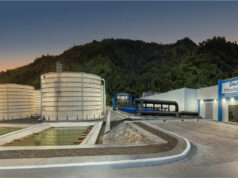
PETRON CORP., the country’s largest oil refiner, reported a consolidated net income of P2.3 billion last year, down 67% from the earlier year after the company’s refining business incurred losses in part because of low production.
“Despite the challenging business environment, we still pursued our strategic goals to sustain our leadership and deliver long-term growth for our company,” Petron President and Chief Executive Office Ramon S. Ang said in a statement on the company’s 2019 financial results.
“Moving forward, we intend to keep our focus on further expanding our reach, strengthening our services and product offerings, and increasing our operational efficiency to better secure our position for the future,” he added.
Petron, which is also a leading participant in the Malaysian market, posted consolidated revenues of P514.4 billion last year, down 8% from the previous year.
Its sales volume was slightly lower at 107 million barrels from the previous year’s 108.5 million barrels after the 5% decline in Philippine volumes as its Petron Bataan Refinery went through an emergency shutdown as a result of the earthquake in April 2019.
Petron’s sales volume in Malaysia grew by 3%, which helped offset the decline in the Philippines.
In the Philippines, operations swung to a net loss of P1.4 billion last year, reversing 2018’s income of P2.8 billion. The losses came after the unplanned total plant shutdown starting in April, resulting in its local refining business incurring losses on low production and the start-up and stabilization activities in August to September.
Petron said its financial results were also affected by the weak refining margins. It said the market remained volatile last year because of the political tensions in the Middle East and uncertainties in the global economy.
Regional prices of finished petroleum products and petrochemicals dropped amid oversupply, with the average Dubai crude down to $63 per barrel in 2019 from $69 per barrel in 2018. The decline also came with the slowdown in demand. Average crude premiums in 2019 rose by almost threefold, further depressing the margins.
Last year, Petron opened 124 new stations, keeping its record of having the most number of stations nationwide at more than 2,400.
Among the highlights in 2019 is the start of commercial operations of its new lube oil blending plant in Tondo, Manila. The facility, which produces lubes and greases for local and foreign markets, has a filling capacity that is twice bigger than Petron’s former plant in Pandacan, Manila.
Petron also started operating its import terminal located in Tagoloan, Misamis Oriental, improving efficiency in product handling and distribution in the south.
It said its major facilities had complied with the government’s fuel marking program before the end last year, affirming its support to the initiative to curb smuggling.
Petron has a combined refining capacity of 268,000 barrels a day. It produces a full range of fuels and petrochemicals. The company operates about 40 terminals in the region and has more than 3,000 service stations.
On Tuesday, shares in the company slipped by 1.92% to close at P3.07 each. — Victor V. Saulon



